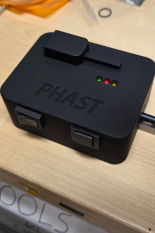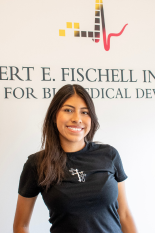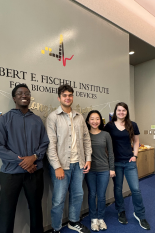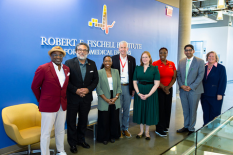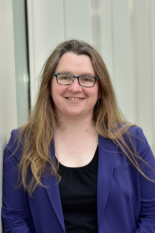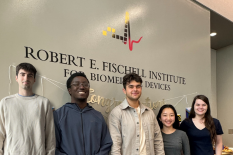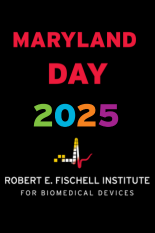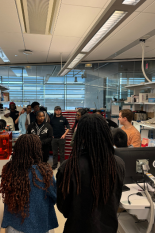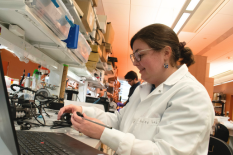News Story
Robert E. Fischell Institute for Biomedical Devices announces 13 new fellows
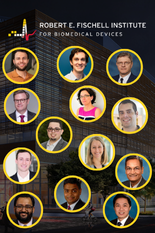
The Fischell Institute welcomes 13 faculty members to its latest cohort of Affiliate Fellows and Fischell Fellows. These members join 35 current fellows at the institute.
Affiliate Fellows perform extramurally funded research and/or translational activities that align with the goals of the Fischell Institute. They also participate in institute seminars, social events, policy, and/or brainstorming sessions.
In addition to the above duties, Fischell Fellows are expected to lead or co-lead the submission of at least one multi-investigator external program a minimum of once every three years, engage in technology transfer opportunities, startups, and development, submit one invention disclosure every three years, and mentor researchers, focusing on Fischell Institute themes.
All fellows gain access to the institute’s staff, resources, facilities, and a network of experts who facilitate not only the prototyping and manufacturing of biomedical devices, but also venture creation, intellectual property development, and product progression through clinical, regulatory, and reimbursement hurdles.
Below, new fellows are introduced, along with brief descriptions of their research interests.
New Affiliate Fellows
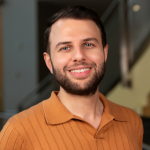 |
Phillip Alvarez Phillip Alvarez is working on bridging the gap between applied research and commercial product development. Leveraging his background in developing innovative optical medical devices and commercializing imaging technologies, he is currently working with faculty and student teams across the University System of Maryland to create new approaches for addressing the health effects of climate change, assessing mental health in 18-to- 29-year-olds, and increasing medical compliance in elderly patients. |
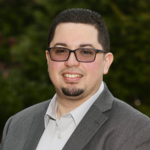 |
Yancy Diaz-Mercado Yancy Diaz-Mercado is interested in the characterization, modeling, and control of systems, with emphasis on multi-agent and robotic systems. Recent projects include the development of scalable control solutions that enable effective control of large-scale networked systems to facilitate robot swarm manipulation, and developing safe electromagnetic robotic manipulators for untethered, ultra-minimally invasive surgical procedures via wireless control of multiple magnetic surgical tools. His research has led to innovations in patent-pending magnetic manipulators and surgical tool designs. |
 |
Matthew Grzywinski Matthew Grzywinski has developed a professional niche in innovation and medical device development. He plans to continue work on two medical device projects that he played a role in developing as a resident at the University of Michigan. He also plans to collaborate with UMB residents and faculty to identify clinical challenges and develop practical solutions that improve acute patient care. |
 |
Miroslaw Janowski Miroslaw Janowski’s research interests center on adding advanced imaging to accomplish precision medicine in neurointerventions. He is using radiolabeling and magnetic labeling of therapeutic agents to deliver them to the central nervous system using real-time interventional PET and MR imaging. He is working on the delivery of a variety of therapeutic solutions to the brain, including antibodies, nanobodies, nanoparticles, viruses, CRISPR-based systems, and cell-based solutions. |
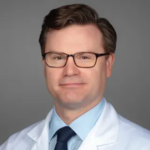 |
Benjamin Powers Benjamin Powers specializes in the management of gastrointestinal cancers. He is an expert in the treatment of peritoneal surface malignancies. His research collaboration within the Robert E. Fischell Institute for Biomedical Devices seeks to use light-activatable nanotechnology to overcome chemoresistance and sensitize colorectal peritoneal disease to heated intraperitoneal chemotherapy. |
 |
Margaret Scull Margaret Scull is interested in airway biology, respiratory virus-host interactions, and antiviral defense mechanisms. Her research employs a suite of novel primary cell systems and in vivo models, in conjunction with molecular virology tools, to uncover mechanisms of viral infection in the lung. |
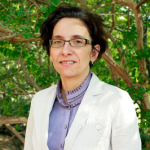 |
Jelena Srebric Jelena Srebric’s research interests include healthy indoor environments through innovation in sustainable mechanical systems. |
New Fischell Fellows
 |
Steven Jay Steven Jay’s research aims to uncover new biological insights towards the design and development of novel biotherapeutics, including proteins, extracellular vesicles (exosomes), and others. His lab also strives to develop new approaches to drug delivery and biomanufacturing using fundamental tools from both engineering and biology.
|
 |
Davis McGregor Davis McGregor is interested in how software and data can be leveraged to improve manufacturing and part qualification. He investigates methods for automating the metrology of diverse part geometries using computer vision and computational geometry, and is developing machine learning models for rapidly qualifying additively manufactured parts. He is especially interested in developing models for qualifying part designs that have never previously been made, such as patient-matched surgical devices, enabling first-time-right manufacturing strategies for additive manufacturing.
|
 |
Khanjan 'KJ' Nagarsheth Khanjan 'KJ' Nagarsheth’s research interests include limb preservation, complex endovascular revascularization, vascular compression syndromes (Nutcracker Syndrome, May-Thurner Syndrome, SMA Syndrome, Median Arcuate Ligament Syndrome), aortic aneurysm and dissection, carotid and cerebrovascular disease, venous disease, and wound care. Developing virtual reality platforms to treat chronic pains and help with post-stroke syndromes. Also investigating the use of topical oxygen therapy and thermal imaging to treat acute and chronic wounds. |
 |
Rajabrata Sarkar Rajabrata Sarkar’s research interests include mechanisms of accelerating collateral artery development, as well as the resolution of deep venous thrombosis. His clinical interests span the entire range of vascular disorders, with a particular emphasis on vascular compressive disorders. Sarkar’s device development work includes automated vascular access devices, electroporation for repair of vascular injuries, and wearable sensors for the early detection of hemorrhage. |
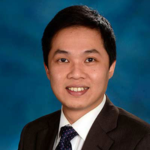 |
Sui-Seng Tee Sui-Seng Tee is interested in the intersection of signaling pathways and metabolism, with the aim of translating these findings for novel metabolic imaging applications. He has pioneered the development of reporter genes for HP-MRS by genetically modifying cells to over-express bacterial and mammalian enzymes. Leveraging his expertise in molecular biology, Tee is investigating growth factor signaling and metabolic pathways.
|
 |
Nagendra Yadava Nagendra Yadava is interested in deciphering the primary role of impaired mitochondrial metabolism in disease susceptibility and therapeutic responses. He has developed genetic and pharmacological models of respiratory chain deficiency to model the causative role of impaired mitochondrial bioenergetics in disease susceptibility. His work has also led to improvements in cellular respirometry techniques, including the Seahorse XF technology. He is an innovator with deep interests in developing devices, methods, and techniques for assessing mitochondrial metabolism close to physiological conditions. Currently, he aims to develop a wearable indirect calorimeter to assess human metabolism on a larger scale. |
Published December 11, 2024

